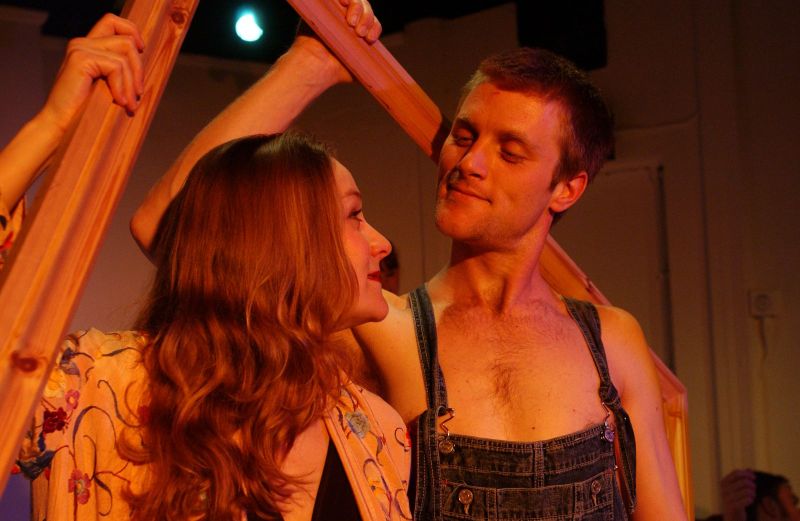
© Image courtesy of StagePhoto
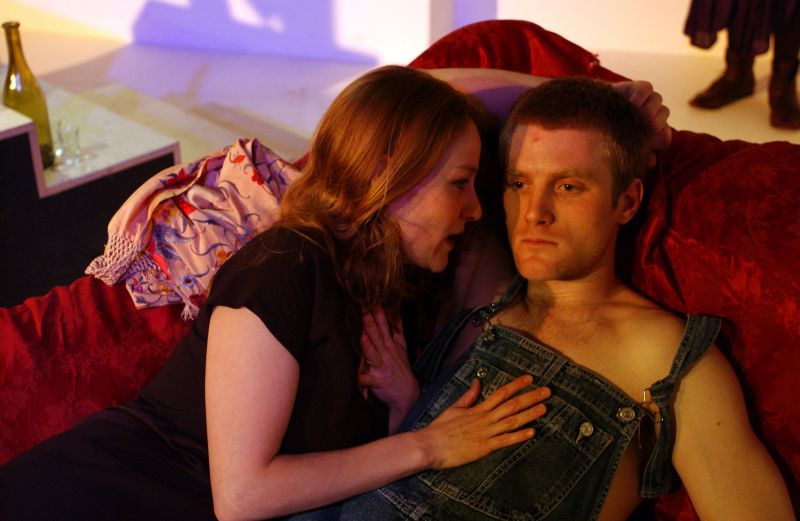
© Image courtesy of StagePhoto
| Anouka Brook | Bertha |
| Andrew Crabb | Axel |
| Paul Engers | Carl/Narrator |
| Stephanie Jory | Therese |
| Cleo Sylvestre | Abel |
| Xavier Williams | Willmer |
“This interesting play by Strindberg deals with the relationshaip between two artists, man and wife, struggling to achieve recognition among the bohemians in fin de siecle Paris. Axel is somewhat successful but his protege Bertha has just been chosen for an exhibition over him and this is where the tide turns. Fuelled by alcohol, ancient jealousies and prejudices begin to rear their ugly head. As dark as it may sound, this production is vivacious, witty and beautifully performed. Anouka Brook is deligfhtful as the scheming Bertha while Andrew Crabb as Axel excels balancing the mixture of male arrogance and unhealthy guilt required. Stephanie Jory as the vivacious Therese and Xavier Williams as the arrogant model Gaga sparkle onstage. Cleo Sylvestre provides fine support as the brittle Abel, while the piece is narrated with skill and clarity by Paul Engers. These are joyous performances, occasionally bordering on caricature but saved by wholly believable drama when required. Designer and director Terje Tveit has created a lively piece of theatre that plays very well. His gregarious style never once seems confined by the intimate size of the theatre and the cast appears at ease with the single set conventions he created. This is a worthy addition to the company's Scandinavian season.”
“Torn apart by their art's desire. Money can destroy a marriage. Axel and Bertha is a play about an artist couple whose relationship breaks apart as they compete for success. It is set in Bohemian Paris where young artists would do anything to get recognition in one of the city's galleries. A web of deceit unravels between them when Bertha's painting is accepted by a sought-after gallery and the play descends into a confusion of arguments and seduction. The story by Swedish playwright August Strindberg, is a cynical look at feminism, with Bertha's short-sighted and cruel attempts to get as much profit from her husband as she can competeing with his typically over-sensitive male ego. [...] This is an engaging and revealing story which exposes some of the disturbing parts of human character with endearing humour. However, the play has a complicated plot and at almost two hours it is a rather long haul.”
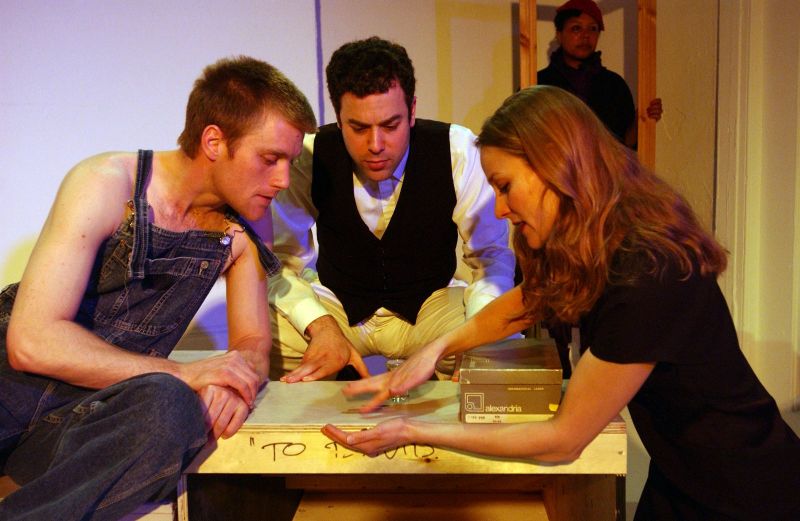
© Image courtesy of StagePhoto

© Image courtesy of StagePhoto
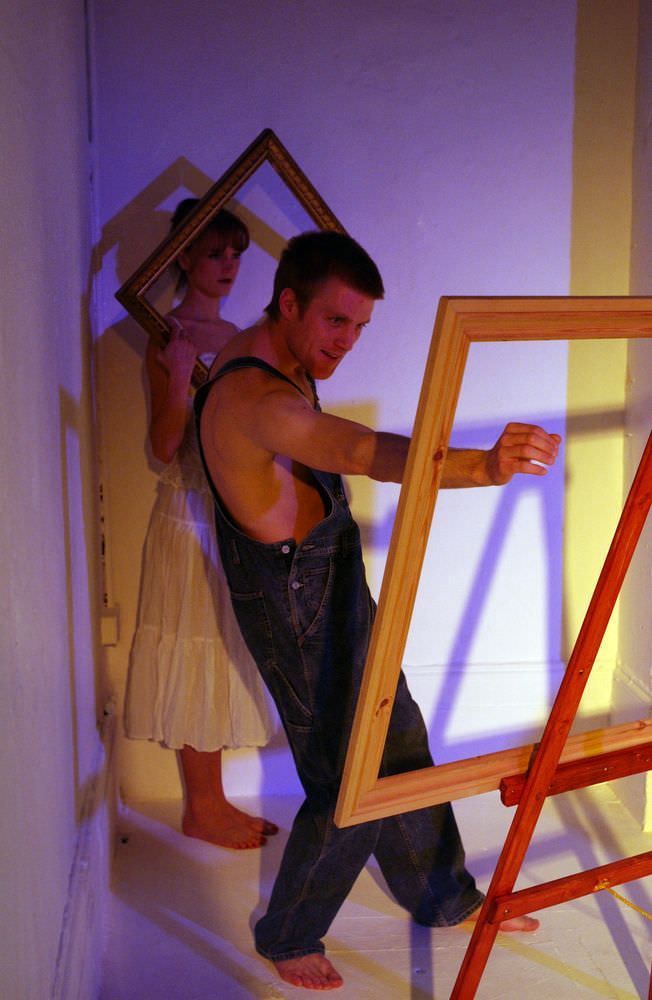
© Image courtesy of StagePhoto
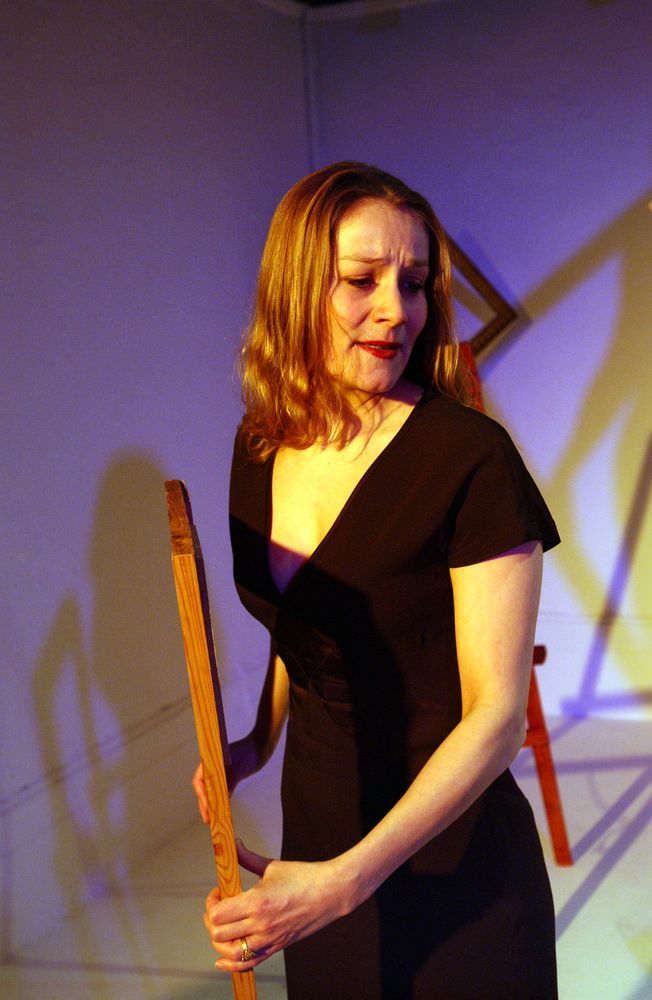
© Image courtesy of StagePhoto
“Despite being written in the late nineteenth century , Axel and Bertha has a distinctly modern feel. Originally titled in Swedish as Kameraterna or Comrades, the relationship that exists between the two central characters bears some classic August Strindberg hallmarks. It is essentially about two people who are locked in a dependent relationship where they seek both to destroy and to possess one another. [...] Strindberg was an expert in interpreting the fine line between love and hate in volatile relationships. Although she is emotionally and financially supported by Axel in her desire for artistic success, Bertha resents the superior talent of her husband. When her painting is accepted to show in the Salon and his is not, he is angered by her crowing delight, accusing her of sucking his talent dry with her own ambitions. This production is successful in the strictest sense as the actors were able to convey the reservations Strindberg had about the sincerity of bohemian life. The original title, Comrades, has a sarcastic ring. Though they think of themselves as enlightened beings who cherish the importance of art above everything, his characters are driven largely by personal success and financial gain. Their work has no independent value but is at the mercy of the whims, fancies and petty rivalries of those who are powerful and rich enough to promote their work. Strindberg wanted to emphasise the idea that many claim to be artists but few actually deserve the status. Though it may sound derogatory, the seven actors in Dale Teater Kompani [Ibsen Stage Company] are to be complimented to appear self-serving or ridiculous every time their art is mentioned. This production are full of stylistic touches in the set and performances. Xavier Williams makes a fittingly louche and dissolute Gaga, the artist's model and hopeless novelist. The three female characters are both realistically sympathetic and infuriating in their efforts to escape the assigned role of muse or subject of the artist. Anouka Brook is striking as bitchy and cynical Bertha. It would be easy to brand the play as sexist in it portrayal of women, but the three actresses are able to give their performances a vulnerability, without being pathetic, that smooth over any hard edges.”
“Strindberg's hit and miss artists. August Strindberg's Kameraterna (here retititled Axel and Bertha) of 1887 is one of the dramatist's least frequently performed plays, at least in this country. The reasons for this are partly evident in this new production by the Dale Teater Kompani [Ibsen Stage Company]. It is a strangely frustrating work - managing to be confused and simplistic at the same time. [...] The problem lies in the characterisation. In a play about equality, the two central figures do not occupy a level playing field. Axel is flawed but essentially decent - conventional and given to conventional fits of jealousy, a bit misogynistic but not to an unusual degree by the standards of the time. Bertha is a monster - Lady Macbeth with turpentine. In her attempts to secure a place for one of her paintings at the prestigious salon of the Roubet's, she is willing to whore her husband, humiliate him and run-up outrageous debts while doing so. Axel does succumb to the temptation of a quickie in a Parisian dorrway, but the respective sins of the couple are far from equal. [...] There are consolations in this production, however. One is that we get to enjoy the performance of Anouka Brook as Bertha. Acidic and tender by turn, this Bertha is slappable and shaggable in equal measure, and never quite loses the sympathy of the audience. Andrew Crabb as Axel looks every bit as hard-done-by as might be expected and Stephanie Jory as the provocative coquette Therese is also very good. [...] The play does lack the taut economy of Strindberg's later works (although Miss Julie was written only a year later). However the director's own excellent translation means the humour of the piece is not lost on a contemporary audience, and fans of Nordic miserablism shouldn't miss a rare opportunity to catch Axel and Bertha while it is around.”